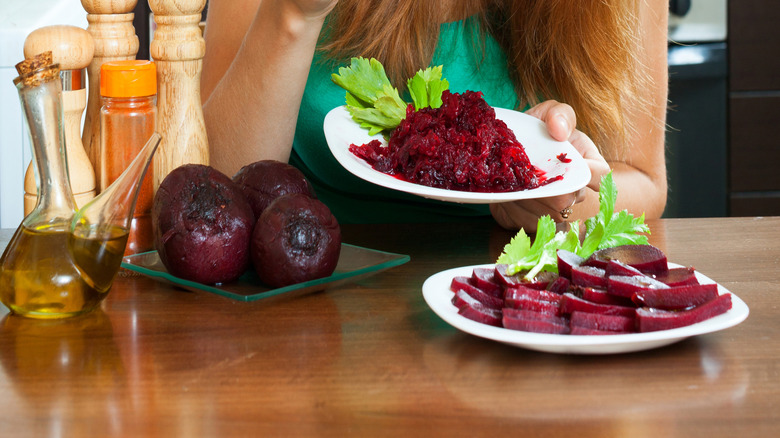We may receive a commission on purchases made from links.

Urbazon/Getty Images
If you’ve ever been constipated, you’re not alone. When it comes to gastrointestinal diseases among adults, constipation is at the top of the list, and according to Johns Hopkins Medicine, roughly 4 million Americans suffer from frequent constipation accounting for 2.5 million trips to the doctor every year.
While you can easily get things moving with an over-the-counter laxative like Ex-Lax, if you’re looking for a natural option instead, then you might want to stock up on beets. “The main component in beets that contributes to gut health and regular bowel movements is the fiber content,” Courtney Pelitera, a Registered Dietitian Nutritionist at Top Nutrition Coaching, exclusively told Health Digest, adding that a one-cup serving of beets provides 4 grams of fiber. “For reference, the typical adult requires 25-35g of fiber per day for optimal gut health.”
As Pelitera further explained, fiber isn’t just essential in keeping bowel movements regular, but it also plays a key role in managing both cholesterol and blood glucose levels — both of which positively contribute to heart health. Fiber also keeps us feeling full longer, so we’re less likely to snack on unhealthy treats throughout the day — something that’s important for those who are trying to keep their calorie count in the healthy range.
“Beets [also] contain other important nutrients as well, including phytonutrients and antioxidants, which help to reduce inflammatory markers,” said Pelitera. In other words, even if you’re not suffering from chronic constipation, you should be eating more beets because of all their health benefits.
Can you eat too many beets?

Jackf/Getty Images
If your main reason for incorporating more beets into your diet is because constipation has become an issue and you’re trying to get your bowel movements more regular, your instinct might be to go a bit overboard in the hopes of moving things along faster. However, too many beets could be problematic.
“There can always be too much of a good thing,” said Pelitera. “With any high fiber foods like root vegetables, eating too many may cause stomach upset, especially if someone is new to introducing high amounts of fiber in the diet, or if fiber is increasing but fluid intake is not increasing.” Because of this, Pelitera recommends that if you’re increasing your fiber intake, you should be doing the same with your water intake. “The two work together to improve bowel function,” said Pelitera, adding that if your poop takes on a vibrant color after you’ve eaten beets, don’t worry about it, because it’s completely normal.
If you have kidney stones, you also want to monitor your beet consumption. According to Cleveland Clinic, beets, both the root and leaves, are high in oxalates which can cause kidney stones. So, naturally, if you know you already have or are prone to kidney stones, moderation is important when eating beets.
Ways to incorporate beets into your diet

Maridav/Shutterstock
If you love the taste of beets, then you’ll probably choose to just boil them and eat them sliced. Or, if you have a juicer, you might consider having a glass of beetroot juice every day. If you’ve never even had a beet and aren’t sure where to start, Pelitera has some suggestions.
“Personally, I love roasted or grilled beets with a little bit of balsamic vinegar,” said Pelitera. “Peel the skin off the outside of the beet, similarly to the way you would peel a potato. You can also boil beets for a more plain, soft texture.” If you find you’re not a fan of beets but still want to reap their dietary benefits, then disguising them by including them in smoothies, salads, or sauces is something to consider. “Canned beets work well for this and are a more convenient option,” said Pelitera.
If you just can’t get yourself to jump on the beet train, then give beet greens (the leaves) a try instead. In fact, when beets were first discovered, people only ate the greens and used the root medicinally. This went on for hundreds of years until the 19th century when French chefs started preparing the root in ways that garnered it a reputation of being a delicacy. Like the root, beet greens are high in fiber, vitamin A, and vitamin C, and even contain more iron than spinach. Basically, between the greens and the root, beets offer a lot of ways to work more fiber into your diet. It just might take a bit of experimenting to figure out the most delicious way to do that.
Credit: healthdigest.com










